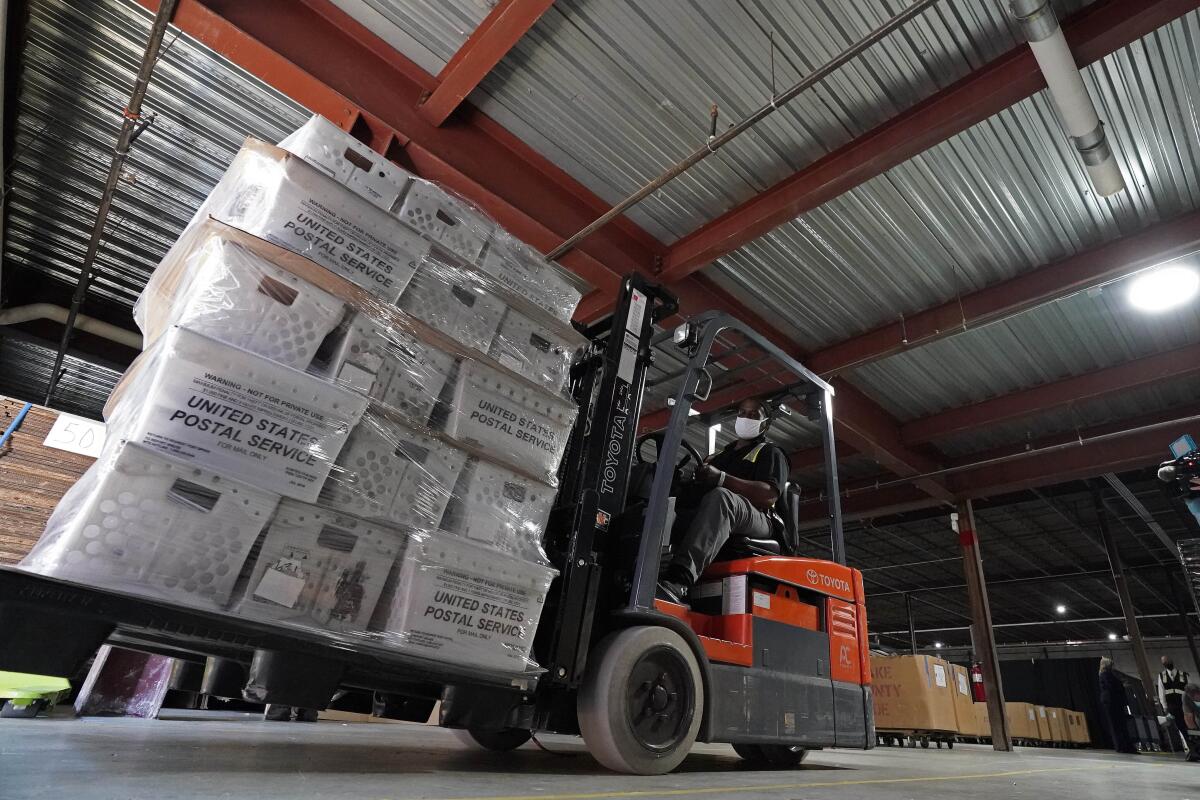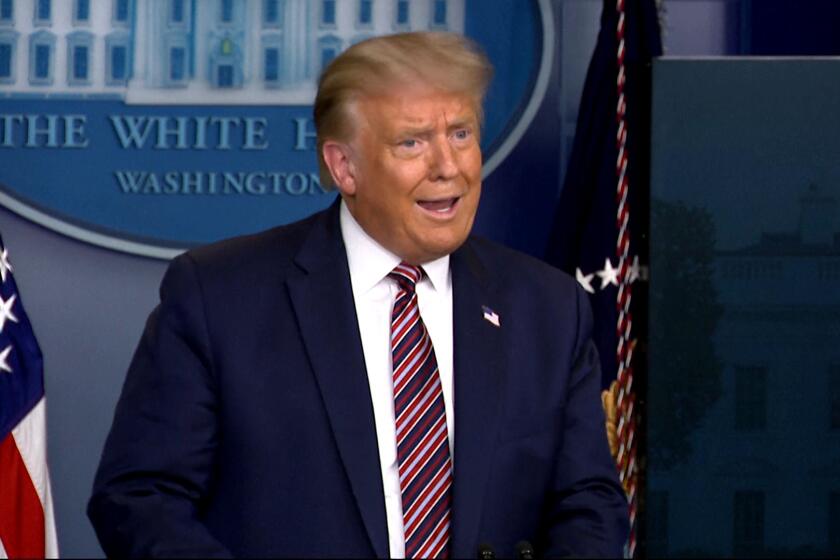When will we know if Biden or Trump won? It could depend on absentee ballot rules in these states

- Share via
Election day? Try election week.
Election officials and the media are preparing for delays in 2020 returns as a record-breaking number of voters are expected to take advantage of expanded mail voting options during a pandemic that continues to kill hundreds each day in the U.S.
Making matter worse, slow U.S. Postal Service delivery has raised concerns about whether ballots will be postmarked and delivered on time, and many of the states that decided the 2016 race with the narrowest of margins have outdated laws on counting absentee ballots that don’t account for this year’s uptick.
In 2016, President Trump surpassed the 270 electoral votes necessary to win thanks in part to razor-thin victories in Wisconsin, Michigan and Pennsylvania. The electoral college’s 538 electors are doled out on a winner-take-all basis in nearly every state (Maine and Nebraska use a proportional system). Ballots that are discounted because they arrived late could tip the election.
In battleground states across the country, pending lawsuits and legislation could drastically change rules on when ballots must be received and when they can be prepared for counting.
“The unofficial results that we report on election night are just that, always have been, unofficial results,” Ohio Secretary of State Frank LaRose said Sept. 8. “This year they may be a little more unofficial than usual, because we know that we’re going to receive a record number of absentee ballots.”
Trump, who has claimed repeatedly and without evidence that mail voting leads to widespread fraud, has called for results to be finalized on election night. Critics have said Trump is setting up to try to delegitimize the results of an election he might lose, including a scenario in which he is ahead on election night, when millions of mail ballots have yet to be counted.
The president has also said he’s unwilling to approve a funding boost for the Postal Service because of the role it will play in delivering millions of absentee ballots. Vote by mail could hurt his election chances, he has said, arguing that his supporters are more likely to vote in person.
Trump says he won’t approve emergency funding for Postal Service, raising the chances of political chaos in November when mail-in ballots flood in.
Trump’s stance on mail voting has helped politicize the process. Democratic voters have been requesting absentee ballots at higher rates than Republicans in some battleground states. Democratic governors and Republican-controlled legislatures in states like Wisconsin, Michigan and Pennsylvania are debating rules on when ballots can be processed and when they’re due. And every battleground state has been subject to lawsuits over mail balloting, with the Trump campaign going after states trying to make it easier to vote in the pandemic.
How long it will take to calculate final results depends on several factors, including when ballots are due and when election officials are allowed to begin preparing ballots for counting.
Before a voter’s selections are tabulated, election officials need to verify the signatures on ballots, open them, flatten them out and scan them through equipment, said Amber McReynolds, chief executive of the National Vote at Home Institute. Ideally, local election officials would be allowed to start processing a ballot when it is received, to let voters know their ballot was accepted, she said. The tabulation of votes usually comes later.
Her organization has been advocating for changes in Wisconsin, Michigan and Pennsylvania, which have Democratic governors, Republican-controlled legislatures and laws that prohibit ballot preparation before election day.
McReynolds, the former director of elections for Denver, noted that state legislators who “set the rules of the game for the election process” are often reluctant to change the process. “We frankly see a lot of resistance to change, because they got elected in the model that exists,” she said.
Michigan Secretary of State Jocelyn Benson has called for her state Legislature to allow election officials to start processing ballots earlier. Officials there expect twice as many mail ballots as usual in November, but a law prohibits any processing before the morning of the election. “If that doesn’t change it may be until Friday evening before the full results of Michigan’s elections are in,” Benson told CNN this month.
Then there’s the question of when ballots must be received: At least five battleground states will accept ballots after Nov. 3 if they’ve been postmarked on or before that day. Others require absentee ballots to be received by election night, though lawsuits in some of those states are pushing to change that.
Here’s where things stand in the states that will likely determine the next president.
Arizona (11 electoral votes)
Excuse needed to vote absentee? No.
When are ballots due? Must be received by 7 p.m. on Nov. 3, election day.
When are ballots processed? Signature verification happens upon receipt. Vote tallying may begin 14 days before the election, but results may not be released until polls close.
Arizona residents have been voting by mail for decades, and the state allows people to permanently sign up to receive absentee ballots. In the August primary, 88% of voters cast their ballots early, primarily by mail. The state is also familiar with the extended counting period that comes with mail ballots — it took six days for the Associated Press to call the 2018 Senate race for Kyrsten Sinema; Martha McSally, who was later appointed to the Senate, was leading on election night.
Florida (29 electoral votes)
Excuse needed to vote absentee? No.
When are ballots due? Must be received by 7 p.m. election day.
When are ballots processed? County officials may begin tallying votes as soon as they complete a public test of ballot-counting machines.
“States like Florida should be able to handle an influx of vote by mail ballots,” said Daniel Smith, the chair of the University of Florida political science department. The state has allowed no-excuse absentee voting since 2002, so voters are familiar with the process. In June, Republican Gov. Ron DeSantis signed an executive order allowing county election officials to start counting votes once tabulation equipment is tested.
“Does that mean there aren’t going to be problems? No,” Smith said. “Throw all that out the window if it’s a close election.”
Georgia (16 electoral votes)
Excuse needed to vote absentee? No.
When are ballots due? Ballots are due at 7 p.m. on election night.
When are ballots processed? Signatures on the envelopes are verified when ballots are received. Ballot scanning may begin Oct. 19. Counting of votes may not begin before polls close.
The state saw a massive increase in absentee voting in its June primary: About 1.1 million ballots were cast by mail, far more than the 37,000 cast in the 2016 primary, according to Georgia Public Broadcasting.
A federal judge in late August blocked the state law that requires ballots to be received by 7 p.m. on election night and ruled that the state must accept ballots that are postmarked by election day and received by country officials in three days. Georgia Secretary of State Brad Raffensperger filed an appeal Sept. 4. The 11th Circuit Court of Appeals voted 2 to 1 in favor of the state and upheld the election day deadline.
Iowa (6 electoral votes)
Excuse needed to vote absentee? No.
When are ballots due? Ballots must be submitted in person by election day; ballots postmarked the day before the election will be accepted until Nov. 9.
When are ballots processed? County auditors can begin counting absentee ballots the day before the election.
Iowa sent absentee ballot request forms to voters ahead of its June primary and will send new request forms ahead of the general election. In June, 78% of voters cast absentee ballots before election day either by mail or in person. In the 2016 primary, just 18% of voters cast absentee ballots.
Michigan (16 electoral votes)
Excuse needed to vote absentee? No.
When are ballots due? Ballots must be received by 8 p.m. on election day.
When are ballots processed? Processing starts the day before the election, and counting begins on election day.
In the state’s August primary, a record-breaking 1.6 million — of 2.5 million — ballots cast were absentee, according to Secretary of State Benson. Michigan voters passed a proposition in 2018 that allows for no-excuse absentee voting.
Benson and other officials have called for allowing ballot processing to begin sooner and changing the requirement that ballots must be received by election day. More than 6,400 absentee ballots in August arrived too late to be counted, according to Benson’s office. Gov. Gretchen Whitmer signed legislation Oct. 6 that allows election officials to begin processing ballots the day before the election.
A Michigan state judge ruled in September that ballots postmarked by Nov. 2 will count if received within 14 days after the election. The state appeals court blocked that decision Oct. 16. By law, ballots in the state are due by 8 p.m. on election day.
Minnesota (10 electoral votes)
Excuse needed to vote absentee? No.
When are ballots due? Mailed ballots must be postmarked by election day and received by Nov. 10. Voters can also turn in ballots in person by 3 p.m. on election day.
When does ballot processing begin? Ballots are verified and accepted or rejected upon receipt. At the close of business on the seventh day before the election, officials may open the ballots and place them in a ballot box. Counting begins after polls close.
Minnesota enacted no-excuse absentee voting in 2014, and 6 out of 10 voters took advantage of that in the state’s August primary. On Aug. 4, a county judge ruled the state should allow ballots postmarked by election day to be counted if they’re received by Nov. 10. The Trump campaign and RNC are appealing, and the ruling and will be considered by the state Supreme Court, which issued a split decision this month in a case on voter assistance. The court upheld a Democratic-backed lower court ruling that blocked enforcement of a cap on how many people a person can assist with voting in-person but reversed a ruling that would have allowed a person to collect and deliver more than three ballots, in a move favored by Republicans.
New Hampshire (4 electoral votes)
Excuse needed to vote absentee? Yes, but the state will allow people concerned with catching the coronavirus or exposing others to vote absentee.
When are ballots due? 5 p.m. on election night.
When are ballots processed? Processing may begin at 1 p.m. on election day, or as early as two hours after polls open if proper notice is given. Counting begins after the polls close on election day.
New Hampshire, which traditionally favors in-person voting, saw a massive uptick in absentee ballot requests ahead of its Sept. 8 primary. Secretary of State Bill Gardner has said he expects the state will have election results on Nov. 3, even with increased absentee ballots.
Meanwhile, the American Federation of Teachers is suing the state to, among other things, extend the mail ballot deadline. The Trump campaign and RNC have asked to intervene in the case to oppose any changes, New Hampshire Public Radio reported.
North Carolina (15 electoral votes)
Excuse needed to vote absentee? No.
When are ballots due? Ballots postmarked by election day will be accepted until Nov. 12.
When are ballots processed? Election officials were allowed to begin processing ballots — including opening of ballots — starting Sept. 29. Counting begins on election day. The state began sending out ballots Sept. 4.
North Carolina officials expect to report on election night the totals for all in-person early voting ballots, election day ballots and mail-in ballots that arrive by Nov. 3, according to Patrick Gannon, a spokesman for the state’s election board. “Whether the media and/or candidates will be able to call winners ... will depend on how close contests are and how many absentee and provisional ballots remain to be counted after election day,” Gannon wrote in an email.
State election officials agreed to extend the deadline for absentee ballots postmarked by election day from Nov. 6 to Nov. 12 as part of a consent decree resolving a lawsuit filed by a retirees group. After a protracted legal battle, the Supreme Court denied Republicans’ request to overturn the agreement, leaving the Nov. 12 deadline in place.
North Carolina is a key state as Democrats try to redraw the political map. The state is trending blue, but it has disappointed them before.
Ohio (18 electoral votes)
Excuse needed to vote absentee? No.
When are ballots due? Ballots postmarked the day before the election will be accepted until Nov. 13.
When are ballots processed? Ballots can be processed as soon as they arrive at the Board of Elections, and counted on election day.
Ohio sent absentee ballot request forms to all 7.8 million registered voters in the state. More than 1 million voters had returned the form as of Sept. 4, a threshold the state didn’t reach until early October in 2016. Ballots will be sent to voters starting Oct. 6 — and LaRose, the secretary of state, said the earliest tallies announced on election night will be the absentee ballots.
Pennsylvania (20 electoral votes)
Excuse needed to vote absentee? No.
When are ballots due? Ballots postmarked by election day must be received by election officials by 5 p.m. on Nov. 6.
When are ballots processed? Counting and processing may begin at 7 a.m. on election day.
Pennsylvania passed legislation last year allowing voters to request absentee ballots without an excuse. In the June 2 primary, about 1.8 million voters received absentee ballots, 17 times more than the number who requested absentee ballots in the 2016 presidential primary, according to election officials. Of those, 1.5 million were returned.
Following a request from election officials and a lawsuit from the state Democratic Party, the state Supreme Court on Sept. 17 ruled that ballots postmarked by election day and received by 5 p.m. three days after the election would count. The court also ruled that ballots that had a missing or illegible postmark would be considered on time if they weren’t obviously mailed after election day. Pennsylvania Republican leaders asked the U.S. Supreme Court to block the order in an emergency request filed in September. On Oct. 19, the high court deadlocked on the request, allowing the Nov. 6 deadline for ballots to remain.
There are also efforts to allow election officials to begin processing ballots sooner, after it took more than two weeks to complete the count of the June primary. Democratic Gov. Tom Wolf has called for giving officials 21 days. A bill written by Republicans in the state Senate would allow processing to begin three days before the election and would move up the deadline to request an absentee ballot, which Wolf opposes.
Wisconsin (10 electoral votes)
Excuse needed to vote absentee? No.
When are ballots due? Ballots are due by 8 p.m. on election day.
When are ballots processed? Processing and counting begins at 7 a.m. on election day.
The state’s April 7 primary in some ways set the tone for the November election — voters chose to mail in their ballots in record numbers even in the midst of a chaotic legal fight. Nearly 1 million people — 60% of April primary voters — mailed in their ballots, far surpassing the historic average of 6%, according to a report by the Wisconsin Elections Commission.
The U.S. Supreme Court ruled that ballots in that primary had to be postmarked by April 7 but could still be counted if they arrived by April 13. About 79,000 ballots arrived between April 8 and 13.
A federal judge granted voters the same six-day grace period for the November election in a Sept. 21 ruling that was then challenged by the Republican National Committee, the Wisconsin GOP and state Republican lawmakers. But that ruling was blocked by the 7th Circuit Court of Appeals, which means absentee ballots will be due by 8 p.m. on election day, as required by state law. Democrats appealed the decision, but the Supreme Court declined to overturn the lower court’s ruling.
More to Read
Get the L.A. Times Politics newsletter
Deeply reported insights into legislation, politics and policy from Sacramento, Washington and beyond. In your inbox twice per week.
You may occasionally receive promotional content from the Los Angeles Times.












